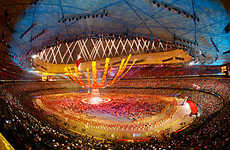
China's Female-Centric Olympic Strategy
Jeremy Gutsche — June 15, 2008 — Lifestyle
References: online.wsj
China's secret formula for the Olympics revolves around women. In short, female sports are underfunded throughout the world. Realizing this, China began over-funding its female teams (relative to the male teams) long ago.
In the past, this strategy has already paid off for China. In Athens (2004), China's women won 19 gold medals vs. 12 for the men. In comparison, American women won 12 gold medals compared to 23 for the men:
Implications - The Chinese Government has recognized that medals won by either men or women increase the country's international athletic ranking. This is one aspect of their policy that treats men and women equally, and it's paying dividends. China is widely considered the only country that can match the United States in female talent.
In the past, this strategy has already paid off for China. In Athens (2004), China's women won 19 gold medals vs. 12 for the men. In comparison, American women won 12 gold medals compared to 23 for the men:
Implications - The Chinese Government has recognized that medals won by either men or women increase the country's international athletic ranking. This is one aspect of their policy that treats men and women equally, and it's paying dividends. China is widely considered the only country that can match the United States in female talent.
Trend Themes
1. Female-centric Sports - There is a growing trend in investing more resources in female sports, which presents an opportunity for sports organizations to capitalize on a growing market.
2. Equal Funding for Men and Women - There is an opportunity for organizations and governments to adopt a policy of equal funding for male and female sports teams to increase the chances of achieving greater success in international competition.
3. Globalization of Female Athletics - With China leading the way, there is a trend towards the globalization of female sports and the creation of new opportunities for female athletes and organizations in the global athletics industry.
Industry Implications
1. Sports - Sports organizations and apparel companies can benefit from the growing market of female athletes and capitalize on the trend towards equal funding for both male and female sports teams.
2. Government - Governments can adopt policies that support female sports and promote gender equality, which will have positive impacts on both the athletics industry and society as a whole.
3. Global Business - The globalization of female sports presents opportunities for businesses to expand their reach and tap into a growing market of female athletes and fans around the world.
3.5
Score
Popularity
Activity
Freshness























